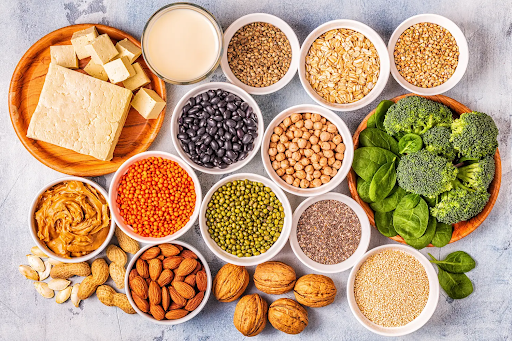Plant Based Chicken Meal Prep Ideas for Busy Professionals
Wiki Article
All Regarding Healthy Food: Benefits of Taking On Plant Based Options
The discussion surrounding plant-based diets has actually obtained substantial focus in the last few years. Lots of people are checking out the prospective health benefits, dietary benefits, and environmental impacts connected with these nutritional selections. As individuals end up being much more familiar with their food's impact on wellness and sustainability, concerns occur about the usefulness of embracing such a way of life. What specific adjustments can one anticipate, and how might these choices improve not only personal wellness however also the earth's future?Comprehending Plant-Based Diets
Several people associate plant-based diet plans mainly with vegetarianism or veganism, these diet regimens can incorporate a vast variety of consuming patterns that prioritize whole, minimally refined plant foods. Such diets often consist of fruits, veggies, whole grains, seeds, beans, and nuts, while getting rid of or limiting pet products. This versatility permits individuals to tailor their nutritional choices according to individual choices and nutritional requirements. Some may adopt a largely plant-based diet while still sometimes consuming meat or milk, frequently described as a flexitarian strategy. The focus stays on including even more plant foods, which can lead to a diverse variety of dishes and flavors. Comprehending these numerous analyses of plant-based eating is vital for valuing its access and appeal in contemporary food culture.Health And Wellness Perks of Plant-Based Foods
The wellness advantages of plant-based foods are substantial, offering a nutrient density benefit that supports overall wellness. Research study suggests that these foods can enhance heart wellness and play an important function in efficient weight administration. By including more plant-based options, individuals may enhance their dietary choices and promote long-term health.Nutrient Density Benefit
Nutrient thickness plays a crucial duty in the wellness advantages of plant-based foods, making them an engaging option for those seeking a balanced diet. Plant-based foods, such as fruits, vegetables, beans, nuts, and entire grains, are usually abundant in necessary vitamins, minerals, and antioxidants while being lower in calories. This high nutrient density allows people to eat less calories while still satisfying their nutritional requirements. In addition, these foods are loaded with nutritional fiber, promoting gastrointestinal health and assisting in weight monitoring. By integrating nutrient-dense plant-based options, customers can improve their overall health, sustain their immune systems, and reduce the threat of persistent diseases. Inevitably, the nutrient thickness of plant-based foods underscores their relevance in a health-conscious way of life.Heart Health Renovation

Weight Management Assistance
In addition to advertising heart health and wellness, a plant-based diet can substantially help in weight monitoring. This dietary approach highlights whole foods such as fruits, veggies, legumes, nuts, and entire grains, which are generally reduced in calories and higher in fiber compared to animal-based items. The high fiber material aids boost satiation, minimizing overall calorie intake. Furthermore, plant-based diet plans are often abundant in essential nutrients while reduced in unhealthy fats, making it much easier to keep a healthy and balanced weight. Gluten Free BBQ Sauce. Research study suggests that people who embrace a plant-based way of living tend to have lower body mass indexes (BMIs) and experience even more effective weight-loss contrasted to those that eat meat-heavy diets. Accepting plant-based alternatives is a strategic choice for effective weight administration.
Nutritional Value of Plant-Based Components
Plant-based active ingredients are abundant in important nutrients, providing a diverse variety of vitamins, minerals, and anti-oxidants that add to total wellness. A contrast of healthy protein resources discloses that while pet items are usually considered as superior, many plant-based options offer sufficient protein and other advantageous compounds. Understanding the nutritional worth of these active ingredients can aid people make notified nutritional options.Necessary Nutrients in Plants
Nutrient-rich components located in plants supply a diverse array of important minerals and vitamins that add considerably to overall health. These active ingredients are rich in vitamins A, C, and K, which support immune function, vision, and blood clot, specifically. In enhancement, plants supply crucial minerals such as potassium, calcium, and magnesium, essential for heart health, muscular tissue function, and bone strength. The visibility of fiber in plant-based foods aids food digestion and advertises a healthy intestine microbiome. Antioxidants, found perfectly in veggies and fruits, assistance combat oxidative stress and anxiety and minimize inflammation. Lots of plant foods are low in calories yet high in nutrients, making them a superb choice for those looking for to maintain a healthy weight while ensuring suitable nutrient intake.
Contrasting Healthy Protein Resources
Protein sources vary substantially in their dietary accounts, with plant-based components offering one-of-a-kind benefits. Unlike pet proteins, which often include saturated fats and cholesterol, plant proteins have a tendency to be lower in these undesirable components. Legumes, nuts, seeds, and whole grains are rich in vital amino acids, fiber, vitamins, and minerals. Lentils supply high protein content alongside substantial iron and folate, while quinoa is a total protein, supplying all 9 vital amino acids. Additionally, plant-based healthy proteins are typically accompanied by anti-oxidants and phytochemicals that support total health and wellness. The change to plant-based protein resources not only boosts nutritional consumption but additionally lines up with lasting dietary techniques, decreasing ecological impact and advertising long-term wellness benefits.Environmental Influence of Plant-Based Eating
As recognition of climate modification expands, numerous people are exploring sustainable dietary choices that can significantly decrease their environmental footprint. Plant-based eating has actually become a significant factor to lowering greenhouse gas exhausts, which are mostly related to livestock production. The farming of fruits, grains, beans, and veggies normally calls for fewer resources, such as water and land, compared to pet farming. In addition, plant-based diet regimens can lead to reduced logging, as much less land is required for grazing animals or expanding pet feed. By changing towards plant-based options, consumers can support biodiversity and promote healthier ecological communities. On the whole, embracing plant-based eating not only benefits personal health and wellness however additionally stands for an essential action towards ecological sustainability YOURURL.com and preservation initiatives.Conquering Common Misconceptions
While lots of people acknowledge the advantages of a plant-based diet plan, a number of mistaken beliefs frequently prevent them from completely accepting this way of life. A typical belief is that plant-based diet regimens lack adequate protein; however, numerous plant resources, such as beans, nuts, and tofu, supply adequate protein. Additionally, some assume that this diet regimen is pricey, when actually, staples like beans, rice, and seasonal veggies can be rather inexpensive. Another misconception is that plant-based consuming is excessively restrictive, whereas it actually supplies a diverse array of tastes and foods. Many fret that a plant-based diet might lead to deficiencies, yet with correct planning, people can acquire all essential nutrients, including vitamins and minerals, while taking pleasure in a wide selection of delicious dishes. Broad Tips for Transitioning to a Plant-Based Way of living Making the shift to a plant-based way of living can be an enriching experience, though it usually needs some advice to navigate the first changes. Initially, people are encouraged to begin gradually, integrating even more fruits, vegetables, vegetables, and entire grains into their meals while decreasing meat and milk usage. Dish preparation is important; preparing a regular food selection can help relieve the modification and protect against last-minute unhealthy options. Discovering brand-new recipes and cooking methods can additionally boost the experience and maintain enjoyment regarding plant-based consuming. In addition, signing up with support system or communities can offer motivation and share useful pointers. Remaining educated concerning nourishment guarantees balanced dishes, preventing shortages while cultivating a healthy, enjoyable plant-based way of living.
Delicious Plant-Based Meal Ideas
Discovering tasty plant-based dish ideas can motivate individuals to embrace a much more healthy diet plan. One prominent option is a passionate quinoa salad, featuring cherry tomatoes, cucumber, and a zesty lemon-tahini dressing. An additional fave is a savory lentil stew, packed with carrots, celery, and great smelling herbs, excellent for a reassuring dinner. For morning meal, over night oats made with almond milk, chia seeds, and covered with fresh berries give a healthy start to the day. Furthermore, a lively veggie stir-fry with tofu and a range of colorful veggies can be a fast yet pleasing dish. Velvety avocado salute on whole-grain bread, sprayed with spices and seeds, supplies an easy yet savory Find Out More treat. These meals showcase the selection and splendor of plant-based consuming.
Regularly Asked Inquiries
Can a Plant-Based Diet Regimen Provide Sufficient Healthy Protein?
The inquiry of whether a plant-based diet regimen can give sufficient protein is common. Various sources, consisting of beans, nuts, seeds, and whole grains, can meet healthy protein requires properly, supporting a nutritious and well balanced diet plan for individuals.Are Plant-Based Diet Plans Suitable for Children?
The suitability of plant-based diet plans for children relies on careful preparation. Sufficient nutrients must be ensured, consisting of proteins, vitamins, and minerals. With appropriate guidance, such diet plans can support healthy and balanced growth and growth in youngsters.Exactly how Do I Eat in restaurants on a Plant-Based Diet plan?
Eating out on a plant-based diet involves seeking restaurants with diverse food selections, requesting for alterations, and exploring vegan-friendly choices. Planning ahead and connecting nutritional preferences can enhance the eating experience while preserving nutritional choices.What Prevail Irritants in Plant-Based Foods?
Typical irritants in plant-based foods consist of soy, gluten, nuts, and seeds - Sugar Free Sauces. People adhering to a plant-based diet plan needs to know these allergens and read labels very carefully to avoid adverse responses and assure safe consumptionCan Plant-Based Diets Assist With Weight Loss?
Study indicates that embracing a plant-based diet plan might help with weight-loss because of its normally reduced calorie thickness and greater fiber material. This combination can improve satiation, helping individuals manage their caloric consumption efficiently. Lots of individuals connect plant-based diet regimens primarily with vegetarianism or veganism, these diet plans can include a wide range of eating patterns that focus on whole, minimally refined plant foods. Nutrient thickness plays a necessary duty in the wellness benefits of plant-based foods, making them a compelling selection for those looking for a well balanced diet plan. Plant-based diet regimens have actually been revealed to significantly improve heart wellness, as they usually consist Website of components that support cardiovascular feature. In addition to promoting heart health, a plant-based diet regimen can significantly help in weight monitoring. A common belief is that plant-based diets do not have sufficient protein; nonetheless, various plant resources, such as vegetables, nuts, and tofu, give adequate protein.Report this wiki page